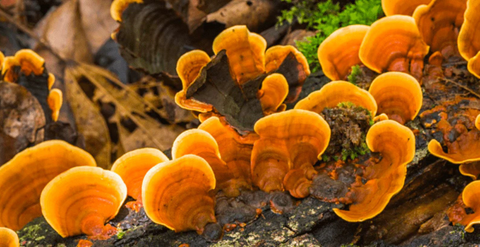If seeking your inner peace and calm is important to you, then look no further than the functional mushroom Reishi (Ganoderma lucidum).
Revered for thousands of years, Reishi is a sacred, spiritual mushroom and as the ‘mushroom of immortality’ has long been considered the province of gods and royalty (1). Whilst its Japanese name is Reishi, in China its known as Lingzhi which means “spiritual potency” (2).
Promote tranquillity
In Traditional Chinese Medicine (TCM), Reishi is considered to have an ‘An-Shen’ effect on the body, which relates to its ability to soothe and calm the nerves to relieve physical and mental unease and restlessness (3).
Interestingly, ‘Shen’ is the Chinese word for ‘deity’ or ‘spirit’ and conveys both meanings of god and divinity, as well as our innate spiritual essence that we radiate out into the world. When balanced, Shen manifests as wisdom and emotional wellbeing, but when imbalanced it is reminiscent of a poor night’s sleep – nervous restlessness, bleary eyes and muddled thinking!
Modern research is increasingly validating much of this ancient wisdom. Reishi’s sleep-supporting effects have been demonstrated in research studies on people with mental exhaustion and sleep issues (4-5). Animal studies also indicate that Reishi is able to support sleep duration through various potential mechanisms of action, including the support of normal inflammatory cytokine balance which plays a part in sleep regulation (6).
The Gut-brain axis
The bi-directional relationship between the brain and the gut is also a significant area of current research. Evidence is mounting to suggest that the gut microbiota is involved in central nervous system responses such as sleep and mood.
Reishi’s collection of polysaccharides, including beta glucans and glycoproteins, have been found to have a balancing effect on the composition of the gut microbiota and act as a prebiotic to nourish gut bacteria (7).
Reishi may also support sleep and nervous system balance via its effect on the gut. Reishi was found to support the maintenance of a healthy gut-brain axis, as well as microbe-dependent serotonin production, which is an important hormonal precursor to melatonin, the sleep hormone (8).
Quality sleep is important for heart health
In TCM, the concept of ‘Shen’ – our spiritual essence and emotional wellbeing – cannot be separated from ‘Xin’ which relates to both the heart organ, and also the mind – how we think and feel. Although we know emotions are manifestations of our mind, we tend to accept that we feel emotions in our heart.
In this school of thought, therefore, ‘Shen’ resides in the heart, so poor sleep at night relates to the inability of Shen to rest and recuperate in the heart. This concept beautifully expresses and explains how emotional worries and concerns can keep us awake at night. It’s also central to the notion that our emotions have a physical effect on our body, and particularly our heart.
Indeed, poor sleep is linked to blood pressure imbalance and poor cardiovascular health. The idea of Shen regulating emotional wellbeing and wisdom also has an interesting correlation with modern scientific findings. In fact, a connection between personality type and heart health was established in conventional medicine as early as the 1950s. It was found that a ‘Type A’ personality – those competitive multi-tasking workaholics, impatient and irritable by time-wasting and disorganisation -were more prone to poor cardiovascular outcomes.
Fortunately, we have Reishi once again to the rescue. As an ‘An Shen’ remedy supporting sleep, emotional wellbeing and calm, Reishi has also been found to support healthy cardiovascular function. It is loaded with over 400 bioactive compounds, particularly triterpenoids and polysaccharides, many of which support healthy blood-pressure and cholesterol balance (9). Plus, it is packed with antioxidant activity to support the body’s innate antioxidant enzyme defence against free radical damage which is important for normal blood vessel functioning (10).
The wisdom of nature
Lucky for us, we have the benefit of thousands of years of observational and experiential use of botanicals to help guide us. The ancient traditions of Reishi being used to support overall health and wellness, longevity and also spiritual growth lays the foundation for it modern-day use (11). Science is increasingly validating the use of Reishi for its significant health supporting effects. Promoting calm and tranquillity is really just the tip of the iceberg.
Use this mushroom to support your sleep, mental focus, emotional wellbeing and heart health. It’s ideal for helping to find your inner zen and, you never know, you might just grow a little wiser in the process!
References
- El Sheikha A. F. (2022). Nutritional Profile and Health Benefits of Ganoderma lucidum ”Lingzhi, Reishi, or Mannentake” as Functional Foods: Current Scenario and Future Perspectives. Foods (Basel, Switzerland), 11(7), 1030. DOI: 10.3390/foods11071030
- Dinesh Babu, P., & Subhasree, R.S. (2008). The Sacred Mushroom “Reishi”-A Review. American-Eurasian Journal of Botany, 1 (3): 107-110, 2008
- Cui, X. Y., et al. (2012). Extract of Ganoderma lucidum prolongs sleep time in rats. Journal of ethnopharmacology, 139(3), 796–800. DOI: 10.1016/j.jep.2011.12.020
- Wang, X. L., & Wang, C. P. (2001). Clinical trials of Ganoderma lucidum on 60 patients suffered insomnia. Zhong Guo Yi Yao Xue Bao, 16, 47-49.
- Tang, W., Gao, Y., Chen, G., Gao, H., Dai, X., Ye, J., … & Zhou, S. (2005). A randomized, double-blind and placebo-controlled study of a Ganoderma lucidum polysaccharide extract in neurasthenia. Journal of medicinal food, 8(1), 53-58.
- Cui, X. Y., et al. (2012). Extract of Ganoderma lucidum prolongs sleep time in rats. Journal of ethnopharmacology, 139(3), 796–800. DOI: 10.1016/j.jep.2011.12.020
- Miaoyu L., et al. (2021). Role of dietary edible mushrooms in the modulation of gut microbiota. Journal of Functional Foods 83(2021) DOI: 10.1016/j.jff.2021.104538.
- Yao, C., Wang, Z., Jiang, H., Yan, R., Huang, Q., Wang, Y., Xie, H., Zou, Y., Yu, Y., & Lv, L. (2021). Ganoderma lucidum promotes sleep through a gut microbiota-dependent and serotonin-involved pathway in mice. Scientific reports, 11(1), 13660. https://doi.org/10.1038/s41598-021-92913-6
- Chan, S. W., Tomlinson, B., Chan, P., & Lam, C. (2021). The beneficial effects of Ganoderma lucidum on cardiovascular and metabolic disease risk. Pharmaceutical biology, 59(1), 1161–1171. https://doi.org/10.1080/13880209.2021.1969413
- Boh, B., Berovic, M., Zhang, J., & Zhi-Bin, L. (2007). Ganoderma lucidum and its pharmaceutically active compounds. Biotechnology annual review, 13, 265–301. DOI: 10.1016/S1387-2656(07)13010-6
- Cör, D., Knez, Ž., & Knez Hrnčič, M. (2018). Antitumour, Antimicrobial, Antioxidant and Antiacetylcholinesterase Effect of Ganoderma Lucidum Terpenoids and Polysaccharides: A Review. Molecules (Basel, Switzerland), 23(3), 649. DOI: 10.3390/molecules23030649




